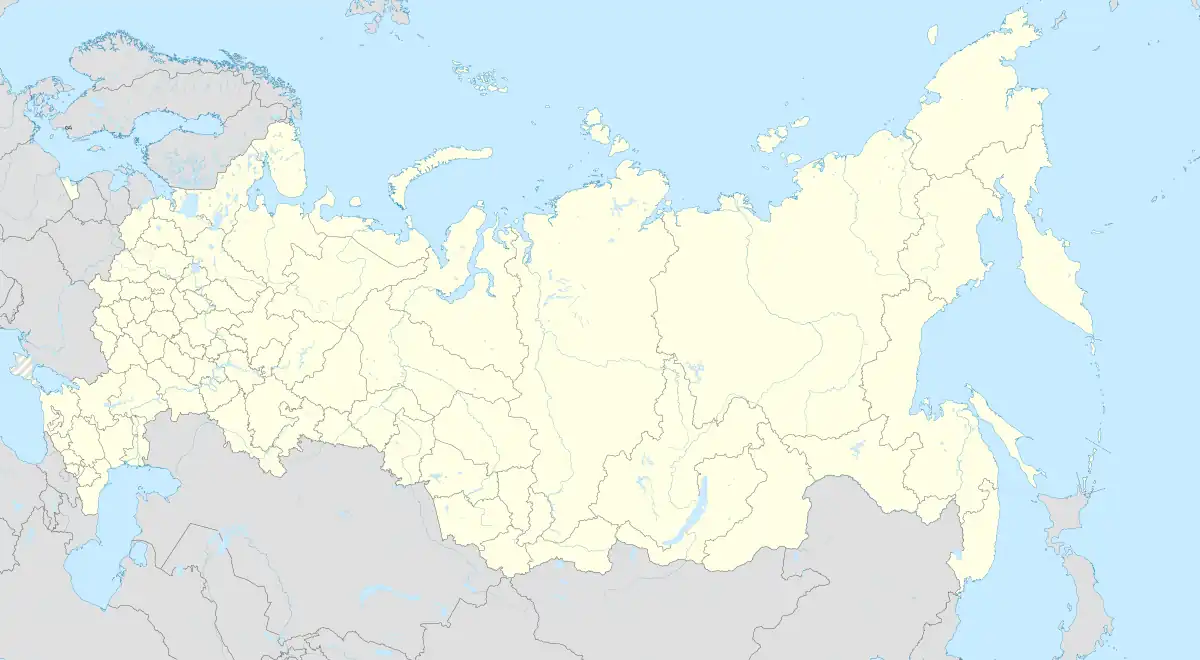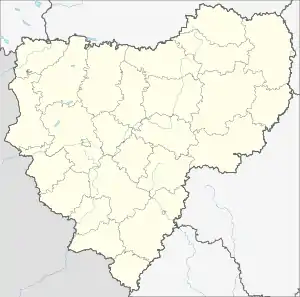Shumyachi
Shumyachi (Russian: Шумячи; Belarusian: Шумячы) is an urban locality (an urban-type settlement) and the administrative center of Shumyachsky District of Smolensk Oblast, Russia. Population: 4,227 (2010 Census);[3] 4,731 (2002 Census);[9] 5,724 (1989 Census).[10]
Shumyachi
Шумячи | |
|---|---|
Settlement[1] | |
.png.webp) | |
Location of Shumyachi | |
 Shumyachi Location of Shumyachi  Shumyachi Shumyachi (Smolensk Oblast) | |
| Coordinates: 53°51′N 32°25′E | |
| Country | Russia |
| Federal subject | Smolensk Oblast[1] |
| Administrative district | Shumyachsky District[1] |
| Urban settlement | Shumyachskoye[1] |
| Founded | 1587 |
| Urban-type settlement status since | 1965[2] |
| Population | |
| • Total | 4,227 |
| • Estimate (2018)[4] | 3,817 (−9.7%) |
| • Capital of | Shumyachsky District[1] |
| • Municipal district | Shumyachsky Municipal District[5] |
| • Urban settlement | Shumyachskoye Urban Settlement[5] |
| • Capital of | Shumyachsky Municipal District[6] |
| Time zone | UTC+3 (MSK |
| Postal code(s)[8] | 216410 |
| OKTMO ID | 66656151051 |
History
Shumyachi is first mentioned in 1587 when it belonged to Poland.[11] In 1772, as a result of the First Partition of Poland, it was transferred to Russia and included in the newly established Mogilev Governorate. It belonged to Klimovichsky Uyezd.[12] In 1919, Mogilev Governorate was abolished, and the area was transferred to Gomel Governorate. In 1922, it was included to Roslavlsky Uyezd of Smolensk Governorate.[2]
On 12 July 1929, governorates and uyezds were abolished, and Shumyachsky District with the administrative center in the settlement of Shumyachi was established. The district belonged to Roslavl Okrug of Western Oblast.[12] On August 1, 1930 the okrugs were abolished, and the districts were subordinated directly to the oblast. On 27 September 1937 Western Oblast was abolished and split between Oryol and Smolensk Oblasts. Shumyachsky District was transferred to Smolensk Oblast. Between August 1941 and 1943, during WWII, the district was occupied by German troops.[12][13] In 1965, Shumyachi was granted the urban-type settlement status.[2]
Economy
The enterprises in the district produce peat, glass, as well as there are several enterprises of food industry.[11]
Transportation
Shumyachi has access to the A130 highway (the "Warsaw Highway") which connects Moscow with Babruysk via Obninsk, Roslavl, and Krychaw. There are also local roads with bus traffic originating from Shumyachi. The closest railway station to Shumyachi Ponyatovka railway station, about 10 kilometres (6.2 mi) south of Shumyachi. It is on the railway connecting Roslavl and Krychaw; there is no passenger traffic.
Culture
In Shumyachi, there is a local museum.[14]
Notable people
References
- Resolution #261
- История п.Шумячи (in Russian). Shumyachsky District Administration. Retrieved 24 August 2017.
- Russian Federal State Statistics Service (2011). Всероссийская перепись населения 2010 года. Том 1 [2010 All-Russian Population Census, vol. 1]. Всероссийская перепись населения 2010 года [2010 All-Russia Population Census] (in Russian). Federal State Statistics Service.
- "26. Численность постоянного населения Российской Федерации по муниципальным образованиям на 1 января 2018 года". Federal State Statistics Service. Retrieved 23 January 2019.
- Law #138-z
- Федеральная служба государственной статистики. Федеральное агентство по технологическому регулированию и метрологии. №ОК 033-2013 1 января 2014 г. «Общероссийский классификатор территорий муниципальных образований. Код 66 656 151 051». (Federal State Statistics Service. Federal Agency on Technological Regulation and Metrology. #OK 033-2013 January 1, 2014 Russian Classification of Territories of Municipal Formations. Code 66 656 151 051. ).
- "Об исчислении времени". Официальный интернет-портал правовой информации (in Russian). 3 June 2011. Retrieved 19 January 2019.
- Почта России. Информационно-вычислительный центр ОАСУ РПО. (Russian Post). Поиск объектов почтовой связи (Postal Objects Search) (in Russian)
- Russian Federal State Statistics Service (21 May 2004). Численность населения России, субъектов Российской Федерации в составе федеральных округов, районов, городских поселений, сельских населённых пунктов – районных центров и сельских населённых пунктов с населением 3 тысячи и более человек [Population of Russia, Its Federal Districts, Federal Subjects, Districts, Urban Localities, Rural Localities—Administrative Centers, and Rural Localities with Population of Over 3,000] (XLS). Всероссийская перепись населения 2002 года [All-Russia Population Census of 2002] (in Russian).
- Всесоюзная перепись населения 1989 г. Численность наличного населения союзных и автономных республик, автономных областей и округов, краёв, областей, районов, городских поселений и сёл-райцентров [All Union Population Census of 1989: Present Population of Union and Autonomous Republics, Autonomous Oblasts and Okrugs, Krais, Oblasts, Districts, Urban Settlements, and Villages Serving as District Administrative Centers]. Всесоюзная перепись населения 1989 года [All-Union Population Census of 1989] (in Russian). Институт демографии Национального исследовательского университета: Высшая школа экономики [Institute of Demography at the National Research University: Higher School of Economics]. 1989 – via Demoscope Weekly.
- Паспорт муниципального образования "Шумячский район" Смоленской области (in Russian). Shumyachsky District Administration. Retrieved 23 August 2017.
- Историческая справка (in Russian). Shumyachsky District Administration. Retrieved 24 August 2017.
- Борис Парфенов; Ольга Хоренженкова. К истории формирования Смоленской области (in Russian). Смоленск. Archived from the original on 31 May 2016. Retrieved 18 June 2016.
- Муниципальное бюджетное учреждение «Шумячский художественно-краеведческий музей» (in Russian). Шумячский художественно-краеведческий музей. Retrieved 23 August 2017.